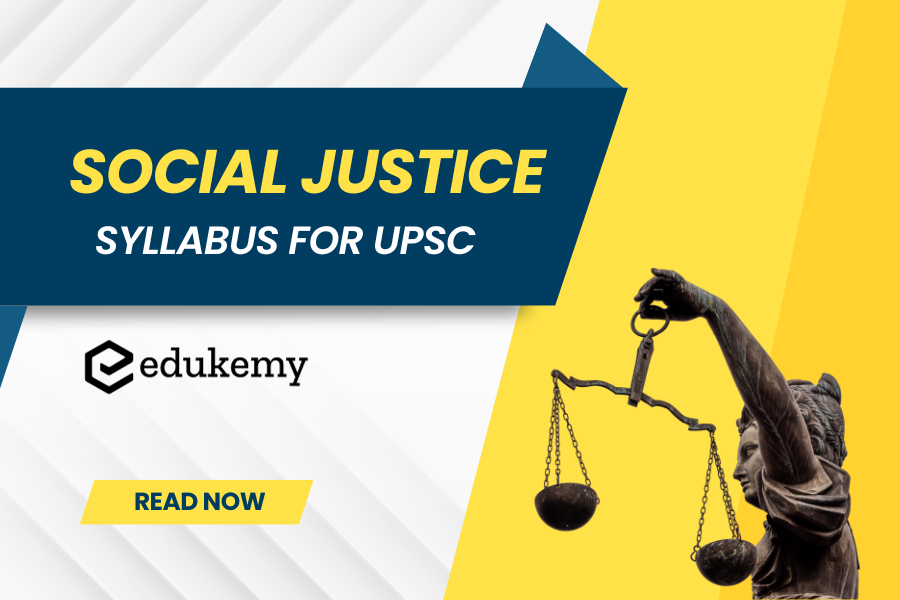
The Social Justice Syllabus for the Union Public Service Commission (UPSC) reflects the commitment to fostering a deeper understanding of the complex issues surrounding social justice in the Indian context. The syllabus encompasses a comprehensive exploration of historical and contemporary perspectives on caste, gender, religion, and other dimensions of social inequality. It delves into the constitutional provisions and legal frameworks aimed at promoting social justice, such as affirmative action policies and anti-discrimination laws. The syllabus also includes the study of socio-economic disparities, marginalized communities, and the challenges they face in accessing education, healthcare, and employment opportunities. Additionally, candidates are encouraged to critically examine the impact of globalization, urbanization, and technological advancements on social justice. Through a multidisciplinary approach, the Social Justice Syllabus aims to equip UPSC aspirants with the knowledge and analytical skills necessary to address the complexities of social issues and contribute to the formulation of inclusive policies that uphold the principles of justice, equality, and dignity for all citizens.
Contents
- 1 Syllabus:
- 2 FAQs for Social Justice Syllabus for UPSC
- 2.1 Q: What is social justice?
- 2.2 Q: How does caste-based discrimination impact social justice in India?
- 2.3 Q: What role does gender play in social justice?
- 2.4 Q: How does economic inequality contribute to social injustice?
- 2.5 Q: What is affirmative action, and how does it address social justice concerns?
- 2.6 Q: Why is education considered a key component of social justice?
- 2.7 Q: How does environmental justice intersect with social justice?
- 2.8 Q: What is the significance of human rights in the context of social justice?
- 2.9 Q: How can the criminal justice system contribute to or hinder social justice?
- 2.10 Q: What is the role of civil society in promoting social justice?
- 3 In case you still have your doubts, contact us on 8792740517.
Syllabus:
- Introduction to Social Justice
- Definition and concepts of social justice
- Historical perspectives on social justice
- Constitutional Provisions
- Fundamental Rights and Directive Principles of State Policy
- Equality, liberty, and justice in the Indian Constitution
- Social Issues in India
- Caste system and untouchability
- Gender issues and women’s rights
- Minorities and their rights
- Tribal rights and development
- Educational and Economic Inequalities
- Access to education
- Affirmative action policies
- Poverty and unemployment

- Welfare Schemes
- Government schemes for social justice
- Role of NGOs in promoting social justice
- Global Perspectives on Social Justice
- International organizations working for social justice
- Human rights and global initiatives
- Issues of Discrimination
- Racism and xenophobia
- LGBTQ+ rights
- Disability rights
- Social Justice Movements
- Historical and contemporary social justice movements in India
- Global social justice movements and their impact
- Role of Media and Technology in Social Justice
- Media’s influence on public opinion
- Use of technology for social justice advocacy
- Legal Framework for Social Justice
- International conventions and treaties related to social justice
- Role of the judiciary in ensuring social justice
FAQs for Social Justice Syllabus for UPSC
Answer: Social justice is the fair and equitable distribution of resources, opportunities, and privileges within a society to ensure that all individuals have equal access to basic human rights.
Answer: Caste-based discrimination continues to affect social justice in India. Understanding its historical context and contemporary manifestations is crucial. Suggested reading: “Annihilation of Caste” by B.R. Ambedkar.
Answer: Gender inequality is a significant social justice issue. Exploring topics such as women’s rights, LGBTQ+ rights, and gender-based violence is essential. Suggested reading: “The Second Sex” by Simone de Beauvoir.
Answer: Economic inequality perpetuates social injustice by limiting access to education, healthcare, and opportunities. “Capital in the Twenty-First Century” by Thomas Piketty is a recommended reading.
Answer: Affirmative action aims to address historical discrimination by providing preferential treatment to marginalized groups. “The Affirmative Action Debate” by Steven M. Cahn is a valuable resource.
Answer: Education is a powerful tool for breaking the cycle of poverty and promoting social equality. “Pedagogy of the Oppressed” by Paulo Freire is a foundational text.
Answer: Environmental justice explores how marginalized communities often bear the brunt of environmental degradation. “This Changes Everything” by Naomi Klein is recommended.
Answer: Human rights are fundamental to social justice, ensuring that individuals are treated with dignity and fairness. “The Idea of Human Rights” by Charles R. Beitz is a useful text.
Answer: Examining issues such as police brutality, racial profiling, and the prison-industrial complex is crucial. “The New Jim Crow” by Michelle Alexander is a must-read.
Answer: Civil society plays a crucial role in advocating for social justice through activism and awareness. “Bowling Alone” by Robert D. Putnam discusses the decline of social capital.
In case you still have your doubts, contact us on 8792740517.
For UPSC Prelims Resources, Click here
For Daily Updates and Study Material:
Join our Telegram Channel – Edukemy for IAS
- Learn through Videos – here
- Be Exam Ready by Practicing Daily MCQs – here
- Daily Newsletter – Get all your Current Affairs Covered – here
- Mains Answer Writing Practice – here

